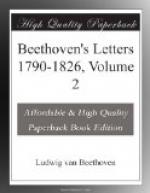279.
A SKETCH WRITTEN BY BEETHOVEN,—
Corrected by Artaria’s Bookkeeper, Wuister.
1819.
Having heard from Herr B. that Y.R. Highness [the Archduke Rudolph] has written a most masterly work, we wish to be the first to have the great honor of publishing Y.R. Highness’s composition, that the world may become acquainted with the admirable talents of so illustrious a Prince. We trust Y. Royal Highness will comply with our respectful solicitation.
FALSTAFF—[1]
Ragged Rascal!
[Footnote 1: The name Beethoven gave to Artaria’s partner, Bolderini.]
280.
TO ARTARIA.
Moedling, Oct. 12, 1819.
Pray forgive me, dear A. (?), for plaguing you as follows:—
We are coming to town the day after to-morrow, and expect to arrive at four o’clock. The two days’ festival compels us to return the same day, as Carl must prepare with his master here for the second examination, these very holidays enabling the tutor to devote more time to him; but I must soon return to town on account of the certificate of Carl’s birth, which costs more time and money than I like. I at all times dislike travelling by the diligence, and this one has moreover one peculiarity, that you may wish to go on what day you please, but it always turns out to be a Friday on which it sets off; and though a good Christian, still one Friday in the year is sufficient for me. I beg you will request the leader of the choir (the devil alone knows what the office is!) to be so good as to give us Carl’s certificate of birth on the afternoon of the same day if possible. He might do so at seven o’clock in the morning, at the time we arrive; but he ought to be punctual, for Carl is to appear at the examination at half-past seven o’clock. So it must be either to-morrow at seven, or at all events in the afternoon. We shall call on you to-morrow before seven o’clock to inquire about this, with the proviso of a visit later in the day. In haste, and asking your pardon,
Your
L. VAN BEETHOVEN.
281.
PETITION TO THE MAGISTRACY.[1]
Oct. 30, 1819.
GENTLEMEN,—
My brother, Carl van Beethoven, died on November 5, 1815, leaving a boy twelve years old,—his son Carl. In his will, by clause 5, he bequeathed to me the guardianship of the boy, and in the codicil B he expressed a wish that his widow, Johanna, should have a share in this duty, adding that, for the sake of his child, he recommended her to submit to my guidance. This explicit declaration of the father, added to my legal claim, I being the nearest relative (clause 198), entitles me clearly to the guardianship of my nephew, Carl van Beethoven; and the Court of Justice, by their Decree E, committed to me, under existing circumstances, the guardianship, to the exclusion moreover of Beethoven’s widow. A journey on business having compelled me to be for some time absent, I did not object to an official guardian supplying my place for the time, which was effected by the nomination of the Town Sequestrator, Herr Nussboeck.




